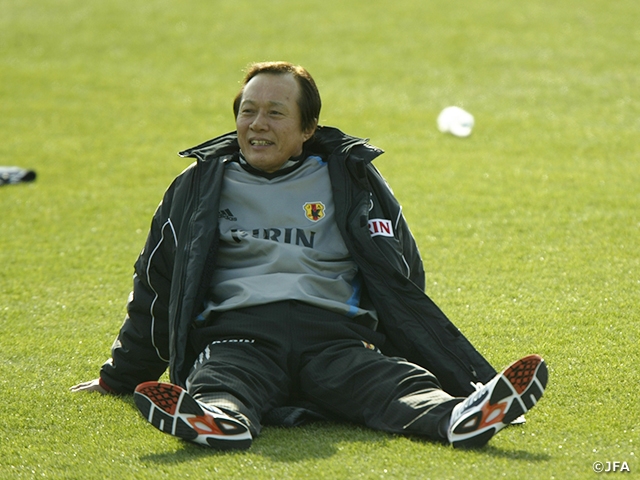NEWS
Passing on Our History – Always Have Respect Vol.149
23 October 2025

Just after the news of Mr. KAMAMOTO Kunishige's passing was reported, I was asked by so many people, "What kind of player was Kamamot-san?" I was shocked and felt strongly: we need to ensure that our history is better known.
I was reminded of an encounter I had in 2012 while covering the London Olympic Games, during which the football matches were held in several cities across Britain. On a media-only shuttle bus, I met a well-known Japanese television personality who had come as the presenter of their TV programme. The location was Newcastle, in the north of England.
"According to the information (The information says that), the media entrance is in 'the Jackie Milburn Stand' - but who's Jackie Milburn?"
“Ummm… let’s see…”
The accompanying TV crew didn’t seem to know the answer, so I couldn’t help stepping in.
“He’s a legend of Newcastle United,” I said.
Jackie MILBURN played 353 matches for Newcastle United during the 1940s and 1950s, scoring a club-record 177 goals and leading the team three-time FA Cup winners. He was also the uncle of England legend Sir Bobby CHARLTON — a name well known even in Japan.
In 1987, the year before Milburn’s death, Newcastle United completed major renovations to their stadium and named the west stand — the main stand — the Jackie Milburn Stand. Since his passing, statues of him have been erected not only outside the stadium but also in various locations around the city.
One can imagine Newcastle supporters, each time they pass those stands or statues, telling their children what kind of player Milburn was, describing the goals that brought glory to their club. And in turn, those children would pass on the same stories to their own.
You can see such scenes all over the world. A young supporter will speak to me — a visiting journalist from Japan — about players from half a century ago, as if they had watched them play in person. By passing their stories down through generations, these legends live on, becoming a source of pride not only for their clubs, but also for their towns and communities.
What about the situation in Japan? I sometimes sense a tendency to focus too much on “today” and “tomorrow,” while taking the past rather lightly.
The phrase “Onko-chishin” is an ancient Chinese proverb meaning "learning from the past to discover new insights." It suggests that knowing history helps us live better lives today. Yet even without such practical benefits, there is inherent value in learning about the past. To know history is to know the achievements and efforts of those who came before us and recognising that their legacy connects to our own lives can give us a deep and genuine sense of pride.
The Japan Football Association (JFA) has its own Hall of Fame, established to honour those who have contributed to the growth and development of Japanese football. I believe it was created in the hope that people today will learn about the history of football in our country and take pride in it.
Kamamoto-san was among the very first to be selected when the Hall of Fame was founded in 2005.
“Finishing as top scorer in the Kanto University League for four years in succession during his Waseda days. Totals 202 goals in 251 career appearances in the JSL (with Yanmar). Achieves unprecedented list of honours, including award for fighting spirit in 1968, finishing as JSL top scorer seven times, leading the league in assists three times, being named in the league's annual best XI 14 times, and winning the overall player of the year award seven times.” (From the “Japan Football Hall of Fame” page on JFA.jp)
Even this brief summary is astonishing. But as adults who love football, I believe we must make greater efforts to share more detailed stories, more often, with younger generations, so that they are passed on through time.
Perhaps the most fitting tribute we can offer to Kamamoto-san is to deepen our understanding of the history of Japanese football itself — and to ensure that his legacy, and those of others like him, continue to be told.
Written by OSUMI Yoshiyuki (Football Journalist)
*This article was originally posted on the Japan Football Association Newsletter, “JFAnews,” September 2025 edition.
Japan Football Association Newsletter “JFAnews”
The Japan Football Association Newsletter “JFAnews” contains all the information on the Japan National Team, events hosted by JFA, tournament results, and team information throughout the nation. The official monthly magazine is a must read for coaches, referees, and all members of the football family.
For information on the newest edition (Japanese website)
Related News
-
Respect and fair play
2025/09/29
A Special Sporting Moment – Always Have Respect Vol.148

-
Respect and fair play
2025/08/21
It Touched My Hand – Always Have Respect Vol.147

-
Respect and fair play
2025/07/24
The goalkeeper who ran to the opponent's goalkeeper - Always have respect Vol.146

-
Respect and fair play
2025/06/25
The Ultimate Sense of Responsibility - Always have respect Vol.145

-
Respect and fair play
2025/05/23
Complacency is a sign of a lack of respect - Always have respect Vol.144

Latest News
-
National Teams
2026/02/12
U-17 Japan National Team squad & schedule - Prayer for Peace; Hiroshima International Youth Soccer Games 2025 (2/17-23@Hiroshima)

-
National Teams
2026/02/12
Nadeshiko Japan (Japan Women's National Team) squad & schedule - AFC Women's Asian Cup™ Australia 2026 (2/23-3/22)

-
National Teams
2026/02/09
U-16 Japan Women's National Team short-listed squad & schedule - Training Camp (2/16-19@Okayama)

-
Referees
2026/02/05
JFA launches "Development Group" in refereeing Mike Riley signed as Referee Development Director

-
National Teams
2026/02/04
U-16 Japan National Team squad & schedule - 4 Nations Tournament (2/9-19@Algarve, Portugal)


